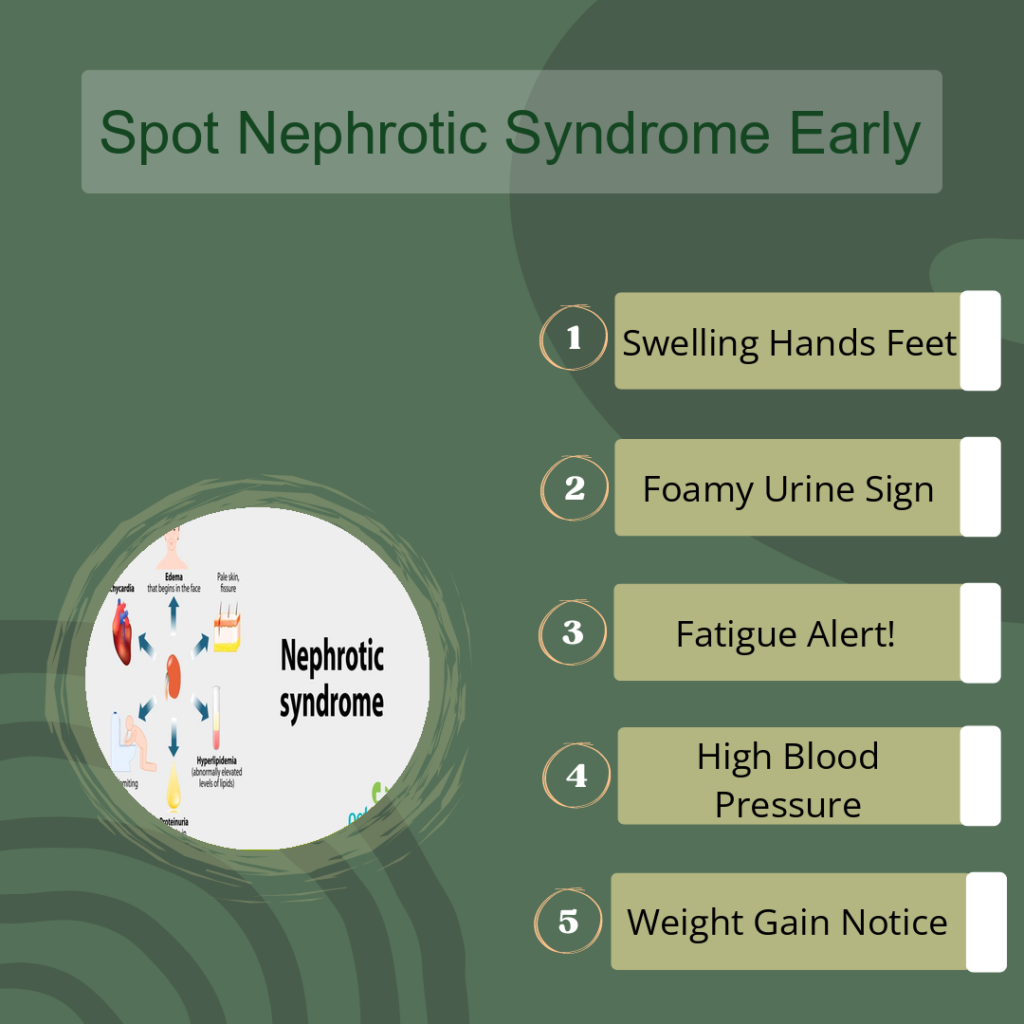Nephrotic syndrome is a significant kidney disorder where too much protein is lost in urine. This condition can affect anyone, but recognizing early nephrotic syndrome symptoms is crucial. Early diagnosis gives a better chance for timely nephrotic syndrome treatment options. Many people don’t realize the importance of monitoring kidney health, which can lead to this overlooked condition.
Deciphering Nephrotic Syndrome: The Basics
Nephrotic syndrome happens when the kidneys, which clean waste from blood, aren’t working correctly. Inside the kidneys are tiny filters called glomeruli. If damaged, they let too much protein slip through and show up in the urine. This results in symptoms like swelling in various body parts.
Key characteristics of nephrotic syndrome include:
- Proteinuria: This is when too much protein leaks into urine.
- Hypoalbuminemia: A low level of protein (albumin) in the blood.
- Edema: Noticeable swelling, especially around the ankles, legs, or face.
- Hyperlipidemia: High levels of fat or cholesterol in the blood.
These elements can significantly affect overall health, making understanding and managing nephrotic syndrome symptoms essential.
Spotting Early Symptoms of Nephrotic Syndrome
Recognizing nephrotic syndrome symptoms can help with early treatment. Edema is the first sign, often appearing in the ankles, eyes, or face. Other common nephrotic syndrome symptoms include foamy urine, due to protein, and feeling tired all day long.
Another risk is infections. Protein loss through urine can weaken the immune system, making the body less able to fight germs. Increased vulnerability to illness is another important nephrotic syndrome symptom to watch. By being aware of these early signs, you can seek medical help sooner.
Root Causes of Nephrotic Syndrome
Nephrotic syndrome causes come from a few sources. The primary nephrotic syndrome causes involve damage to the kidney’s tiny filters. This can be due to kidney diseases or conditions affecting kidney function directly.
Secondary nephrotic syndrome causes link to broader issues. Diseases like diabetes and lupus can lead to kidney problems, indirectly causing nephrotic syndrome. Additionally, certain medications and harmful toxins might damage the kidneys, acting as secondary nephrotic syndrome causes.
Diagnosing Nephrotic Syndrome: A Medical Overview
The nephrotic syndrome diagnosis involves several key tests. A urine test checks excess protein. Blood tests can gauge low protein levels or elevated cholesterol. If these tests don’t explain enough, a kidney biopsy — examining a small kidney tissue — might be necessary.
Early and precise nephrotic syndrome diagnosis is crucial. Knowing the exact cause helps guide nephrotic syndrome treatment options, ensuring the most appropriate care is provided.
Navigating Complications of Nephrotic Syndrome
Complications of nephrotic syndrome can be serious if not managed well. One of the significant ones is increased risk of infections because of protein loss. There’s also the danger of blood clots forming due to protein changes.
High cholesterol is another concern from complications of nephrotic syndrome. Over time, untreated high cholesterol can lead to heart issues or chronic kidney disease, showing the importance of managing these complications.
To navigate these complications of nephrotic syndrome, it’s vital to:
- Monitor and manage cholesterol levels.
- Stay alert to signs of infections.
- Regularly check blood clot risks.
- Follow doctors’ advice to keep the condition in check.
Holistic and Medical Treatment Options for Nephrotic Syndrome
Treating nephrotic syndrome involves addressing its underlying nephrotic syndrome causes. Doctors usually start by focusing on the root problem that affects kidney function.
Medications play a significant role. Diuretics help control swelling (edema) by removing excess water. Cholesterol-lowering drugs manage high cholesterol, a common nephrotic syndrome symptom. Another part of nephrotic syndrome treatment options entails blood pressure medicines to protect kidneys from further harm.
Lifestyle changes can also aid in nephrotic syndrome treatment options. A low-salt diet is essential to avoid extra swelling. Some patients may need to reduce protein intake for better kidney health.
In severe cases, more intensive nephrotic syndrome treatment options might be necessary. Dialysis helps filter waste from blood when kidneys are severely affected. Kidney transplants are another route for those whose kidney function significantly declines.
For ongoing management, exploring innovative treatments like immunotherapy may offer new hope. With the right plan, treating nephrotic syndrome becomes more effective and gives patients better control over their health.
Living with Nephrotic Syndrome: Practical Tips and Support
Living with nephrotic syndrome requires a proactive approach. Staying committed to medication routines and regular monitoring is crucial for managing nephrotic syndrome symptoms.
Making lifestyle changes can ease daily living. Here are some practical tips:
- Opt for a low-sodium diet to help lessen swelling.
- Engage in gentle exercises to improve overall health.
- Keep fluid intake appropriate as advised by healthcare providers.
It’s important to stay on top of health checks for complications of nephrotic syndrome. This helps avoid further kidney issues or other health concerns.
Support is vital. Patients and families should tap into resources and support networks. These avenues provide valuable information, reduce stress, and offer a sense of community, enhancing patient confidence in treating nephrotic syndrome.
Conclusion: Empowering Health through Awareness and Action
Understanding nephrotic syndrome and its effects on health underscores the value of being informed. Early detection of nephrotic syndrome symptoms and nephrotic syndrome diagnosis can lead to effective nephrotic syndrome treatment options.
Encourage seeking professional help promptly when symptoms surface. Routine check-ups are essential to monitor kidney health and prevent onset. Empowering yourself with knowledge and timely action can significantly impact managing nephrotic syndrome effectively.

